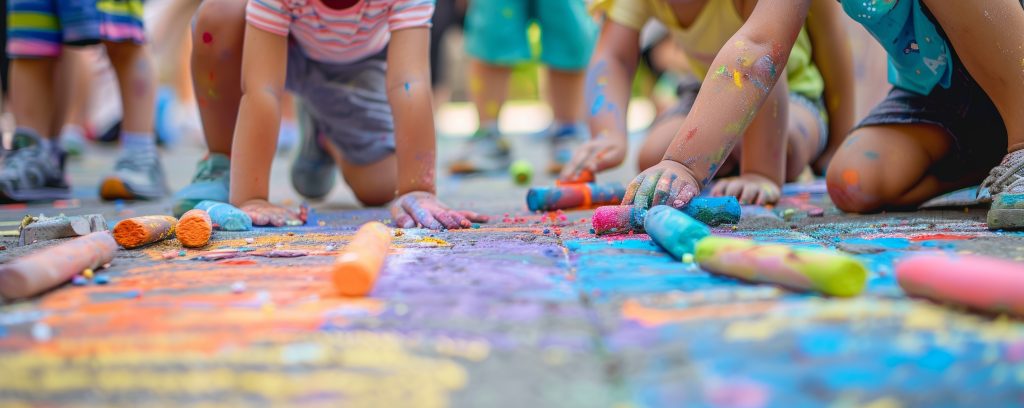
For young children, the world is full of wonder, and one of the best places for them to explore that wonder is outdoors. Outdoor learning and play are essential components of early childhood education, offering benefits that go beyond the classroom. Whether it’s running through open spaces, digging in the dirt, or observing animals and plants, outdoor activities provide rich opportunities for children to develop physically, socially, emotionally, and cognitively.
In this blog, we’ll highlight the many benefits of outdoor learning and play for preschoolers and explore why incorporating time spent outdoors is essential for young children’s development. We’ll also discuss how schools can balance structured outdoor activities with free play, ensuring that children benefit from both guided learning and self-directed exploration.
Why Outdoor Play is Essential for Preschoolers
Children naturally thrive in outdoor environments. Being outdoors provides children with unique learning experiences that cannot be replicated inside the classroom. Whether it’s observing the change of seasons, engaging in physical challenges, or exploring natural elements, outdoor play stimulates children’s curiosity and fosters holistic development.
Here are some of the key reasons why outdoor learning and play are crucial for preschoolers:
- Physical Development: Outdoor play encourages children to move, run, jump, climb, and explore, helping to build motor skills, coordination, and overall physical health.
- Cognitive Growth: Nature provides endless opportunities for discovery and problem-solving, helping children develop critical thinking and observational skills.
- Emotional Well-being: Time spent outdoors has been shown to reduce stress, improve mood, and promote emotional resilience in young children.
- Social Skills: Playing outdoors with peers encourages teamwork, cooperation, and communication, helping children build strong social skills.
Let’s dive deeper into these benefits to understand how outdoor learning can have a positive impact on early childhood development.
Benefits of Outdoor Learning and Play for Preschoolers
1. Physical Health and Motor Skill Development
One of the most obvious benefits of outdoor play is its positive impact on children’s physical health. In today’s world, where children often spend more time in front of screens than playing outside, providing opportunities for physical activity is more important than ever.
- Gross Motor Skills: Outdoor activities such as running, jumping, and climbing help develop gross motor skills. These activities strengthen muscles, improve coordination, and enhance balance, all of which are essential for healthy physical development.
- Fine Motor Skills: Outdoor play also supports fine motor development. For example, children might pick up small objects like leaves or rocks, manipulate tools for digging, or create patterns in the sand. These activities require precision and dexterity, building important hand-eye coordination.
- Promotes Overall Health: Outdoor play encourages physical movement, which helps reduce the risk of childhood obesity, supports cardiovascular health, and builds healthy habits that last a lifetime.
The fresh air and wide-open spaces of the outdoors provide a natural setting for preschoolers to burn off energy, build strength, and develop coordination—all while having fun.
2. Cognitive Development and Problem-Solving
Outdoor environments offer countless opportunities for exploration and learning, stimulating children’s cognitive development. The natural world provides endless new experiences, from discovering how insects live to observing changes in weather patterns, that spark curiosity and invite problem-solving.
- Observation and Discovery: When children spend time outdoors, they become natural scientists. They observe how plants grow, how water flows, and how different animals behave. These experiences nurture curiosity and teach children to observe, ask questions, and make predictions—skills that are fundamental to cognitive development.
- Imagination and Creativity: Outdoor environments offer a blank canvas for imaginative play. A simple stick can become a magic wand, and a pile of leaves can turn into a fortress. This unstructured play fosters creativity, allowing children to use their imagination to create scenarios, solve problems, and invent new games.
- Spatial Awareness and Directionality: Outdoor play also helps children develop spatial awareness, which is crucial for early math and geometry skills. Activities like climbing, jumping from one spot to another, or navigating through playground equipment require children to understand spatial relationships.
Incorporating outdoor learning into the preschool curriculum helps children develop critical thinking skills, creativity, and a natural love for discovery.
3. Emotional Well-Being and Mental Health
Outdoor play has significant benefits for children’s emotional health and well-being. Spending time in nature has been shown to reduce stress, improve mood, and promote relaxation—benefits that are especially important for young children as they learn to navigate their emotions.
- Stress Relief: The natural environment has a calming effect on children, reducing feelings of anxiety and stress. Outdoor play allows children to release pent-up energy and emotions, promoting a sense of freedom and relaxation.
- Boosts Mood: Exposure to sunlight increases the production of serotonin, a hormone that improves mood and promotes feelings of happiness. For preschoolers, time spent outdoors can help regulate emotions, boost self-esteem, and encourage a positive outlook.
- Fostering Resilience: Outdoor play encourages children to take risks, try new things, and overcome challenges. Whether they’re climbing a tree or learning how to balance on a beam, these experiences build confidence and resilience, teaching children to cope with setbacks and keep trying.
The freedom of the outdoors provides an emotional outlet for preschoolers, helping them manage their feelings and build emotional resilience.
4. Social Development and Peer Interaction
Outdoor play is often more collaborative than indoor activities, as children have the space to engage in group games, imaginative play, and problem-solving tasks with their peers. These experiences help children develop important social skills, such as cooperation, communication, and conflict resolution.
- Teamwork and Cooperation: Group games like tag, hide-and-seek, or building a fort together require children to work as a team, negotiate roles, and cooperate to achieve a shared goal. These experiences build teamwork and teach children how to collaborate with others.
- Communication and Language Skills: Outdoor play encourages children to communicate with each other, whether they’re organizing a game, making up rules, or sharing their observations about nature. These interactions help children develop language skills, practice active listening, and learn how to express their thoughts clearly.
- Conflict Resolution: In an outdoor setting, conflicts may arise when children want to play different games or use the same piece of equipment. These moments offer valuable opportunities for children to learn how to resolve disagreements, compromise, and understand other perspectives.
By fostering peer interaction and teamwork, outdoor play helps children build social skills that will serve them throughout their lives.
Incorporating Outdoor Learning into the Preschool Curriculum
While free play is essential, outdoor learning can also include more structured activities that align with educational goals. Teachers can plan outdoor lessons that integrate nature into the curriculum, helping children make connections between the world around them and what they’re learning in the classroom.
Here are some ideas for incorporating outdoor learning into the preschool curriculum:
- Nature Walks: Take children on nature walks to explore the local environment. Encourage them to observe plants, animals, and insects, and discuss what they see. Nature walks are an excellent way to teach children about science, ecology, and the natural world.
- Outdoor Art Projects: Use natural materials like leaves, sticks, and rocks for outdoor art projects. Children can create collages, sculptures, or patterns with found objects, combining creativity with a deeper appreciation of nature.
- Gardening: Involving children in a gardening project teaches them about plant life cycles, responsibility, and patience. They can plant seeds, water the garden, and observe how plants grow over time.
- STEM Activities: Outdoor spaces are ideal for hands-on STEM learning. Children can experiment with building structures using natural materials, investigate how different elements of nature interact, and explore basic physics concepts like balance and weight.
Outdoor learning not only engages children’s senses and curiosity but also supports a well-rounded educational experience that blends physical activity with cognitive development.
Balancing Structured Outdoor Learning with Free Play
Both structured outdoor learning and unstructured free play offer significant benefits for preschoolers, and finding a balance between the two is key. Structured activities provide opportunities for guided learning, while free play allows children to explore their interests, build independence, and practice problem-solving on their own terms.
Here’s how schools can balance these approaches:
- Scheduled Outdoor Play: Ensure that outdoor play is part of the daily schedule, allowing children ample time to run, climb, and explore freely. This unstructured time helps them develop self-regulation, creativity, and independence.
- Guided Outdoor Lessons: Incorporate short, focused outdoor lessons that align with the day’s learning objectives. These lessons might include nature-based STEM activities, observation of seasonal changes, or outdoor art projects.
- Child-Led Play: Offer opportunities for child-led play, where children have control over what they do and how they interact with their environment. This allows them to follow their interests, make decisions, and take ownership of their learning.
By providing both structured and unstructured outdoor learning experiences, schools can support the holistic development of preschoolers while fostering a love of nature and physical activity.
How WizHippo Can Support Outdoor Learning
WizHippo is a daycare management system designed to help early childhood educators track and document children’s learning and development, including their outdoor activities. Here’s how WizHippo can support outdoor learning and play:
- Daily Activity Tracking: WizHippo allows teachers to track children’s outdoor activities, noting the skills they’re developing, the challenges they’re overcoming, and any milestones they reach during outdoor play.
- Parent Communication: Share real-time updates with parents about their child’s outdoor experiences. Teachers can upload photos, notes, and observations about outdoor activities, keeping parents engaged and informed.
- Progress Reports: Document how outdoor learning contributes to a child’s physical, cognitive, and social development. WizHippo’s progress reporting tools make it easy to highlight the benefits of outdoor play in children’s overall growth.
By using WizHippo, schools can create a comprehensive record of each child’s outdoor learning journey, ensuring that both parents and educators can see the value of time spent in nature.
Conclusion
Outdoor learning and play are vital for preschoolers’ development, offering benefits that span physical health, cognitive growth, emotional well-being, and social skills. By incorporating outdoor activities into the daily routine, schools can create enriching, holistic learning experiences that support young children’s growth in meaningful ways.
Ready to enhance your daycare or preschool’s approach to outdoor learning? Visit WizHippo today to discover how our platform can help you track and share the developmental milestones that happen both in the classroom and outdoors.

Stay Updated with the Latest in Daycare Management!
Subscribe to our newsletter to receive expert tips, industry news, and special offers straight to your inbox. Plus, get exclusive access to free resources and guides to help you streamline your childcare operations.
